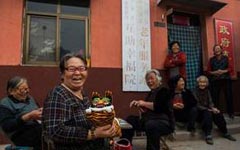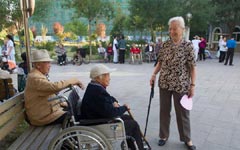"The house is generally believed to be the dearest gift to offspring; and many elders prefer to spend the rest of their life in their own home," said Wen Jun, a sociologist at East China Normal University.
Even childless seniors may not favor such choices. Some, like Xia, would rather use the house to secure a care-taker, while others see disgrace in trading it away at all.
|
 |
 |
"The house is very important for Chinese, like the root of a family. Deeding my house will invite gossip and suspicion from others," said Sun Huifen, 57, in Shanghai.
Sun, who lost her only daughter years ago to cancer, urges the government to offer easier access to eldercare services and show greater care to elderly who have lost their only children.
Instead of applying for the program, her plan is to have the house sold after the couple's death to establish an education fund named after their daughter.
Why the backfire
Analysts say the house-for-pension is only a niche product, mainly an option for childless urban seniors to improve their livelihood. Its introduction in China is seen as an effort to diversify the eldercare market.
However, controversy has raged since the State Council introduced the concept last year. Apart from the clash with family values, experts say the backfire also illustrates the widespread anxiety about China's eldercare sector.
"It's a question of who should shoulder the responsibility. The public has long seen the government as the major provider of social security, but now the government hopes to bring in more market and social forces, which may be hard to accept for some," Wen said.
